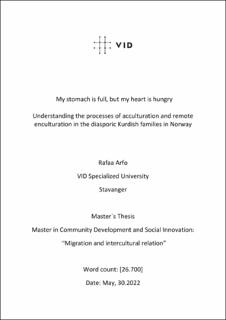| dc.contributor.author | Arfo, Rafaa | |
| dc.date.accessioned | 2022-09-09T09:18:40Z | |
| dc.date.available | 2022-09-09T09:18:40Z | |
| dc.date.issued | 2022-05 | |
| dc.identifier.uri | https://hdl.handle.net/11250/3016821 | |
| dc.description | Master in Community Development and Social Innovation. VID Stavanger, 2022 | en_US |
| dc.description.abstract | This empirical research addresses two important issues related to the life of the diasporic
Kurdish families having young children born in Norway. Considering the family here is meant
the first-generation immigrants and the second one. To this end, three different concepts have
been utilized to facilitate the research on the phenomena under study. The first is
acculturation, how those parents maintain their own original culture's values and norms while
approaching the host land culture and adapting to its cultural norms and behaviours. In other
words, how this dual-functionality is characterized and carried out. While, the second concept
is enculturation. It is referred to as a process of individuals’ learning about their group culture.
However, those targeted families’ second-generation children were born in a varied context,
not their original one. As a result, the ‘remote enculturation’ term has been employed as more
inclusive of tackling the issue. Remote enculturation is a new concept that has been suggested
to address the issue of children’s learning about their heritage culture from afar, utilizing
modern communication and technological advances as modern avenues of learning. The third
term is the ‘diaspora’ which has been used purposely to describe and categorize those
families’ immigration experience, among other novelty patterns of immigration such as
transnationalism | en_US |
| dc.language.iso | eng | en_US |
| dc.rights | Attribution-NonCommercial-NoDerivatives 4.0 Internasjonal | * |
| dc.rights.uri | http://creativecommons.org/licenses/by-nc-nd/4.0/deed.no | * |
| dc.subject | kurds | en_US |
| dc.subject | immigrants | en_US |
| dc.subject | diaspora | en_US |
| dc.subject | enculturation | en_US |
| dc.title | My stomach is full, but my heart is hungry Understanding the processes of acculturation and remote enculturation in the diasporic Kurdish families in Norway | en_US |
| dc.type | Master thesis | en_US |
| dc.description.version | publishedVersion | en_US |
| dc.source.pagenumber | 96 | en_US |

